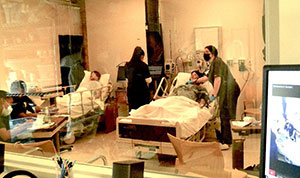Mobilizing Healthcare Education to Solve Worker Shortage
News Article Article pages that do not meet specifications for other Trust Project Type of Work labels and also do not fit within the general news category.

Four nursing students intently observed fellow students practice special care on a full-body manikin with real body functions in a simulation at Pace University last Thursday.
Also watching the exercise in the fully-equipped exam room at the university’s College of Health Professions in Pleasantville was state Sen. Peter Harckham (D-Lewisboro), who toured the college’s clinical labs to become better acquainted with how the healthcare workforce is educated, crucial to recruiting more workers into the medical profession.
The national shortage of healthcare workers has grown exponentially since the COVID-19 pandemic. According to the state Department of Health, nurses provide 90 percent of all care to patients in hospitals, and by 2030 the projected shortage will be of more than 39,000 registered nurses in New York. The American Nurses Association called for the U.S. Department of Health and Human Services to declare a national nurse staffing crisis.
Pace offers accelerated nursing programs to help address the shortage. The Pleasantville campus has an 8,500-square-foot lab and includes six patient exam rooms, four simulation suites, two large clinical laboratories and three classrooms. In lieu of hard-to-get cadavers to dissect, the college boasts a Sectra Virtual Anatomy Table for virtual dissections where students can visualize tissue, muscles and organs.
Joining Harckham on the tour was College of Health Professions Dean Marcus Tye and Chief Wellness Officer Dr. Harriet Feldman. The roundtable discussion following the tour included nursing students in their senior year and professors.
Harckham asked students what they considered to be a pro-active effort to attract more people to nursing.
“And once we attract more people to the profession, how would you make it easier for them to be educated and trained?”
Nursing student Alexis Ninonuevo said she came to Pace because the college offers direct admissions.
“When you apply here you are accepted,” Ninonuevo said. “At other schools, you apply and get in but after one or two years you have to apply into the nursing program and it’s not a guaranteed ‘in.’ If there were more schools that had direct admissions, that would help.”
Ninonuevo is studying critical oncology care and hopes to work at Sloan Kettering after she graduates.
Recruiting highly-qualified teaching staff has also been a problem for nursing colleges, especially because nursing and professional faculty are aging and retiring at an unsustainable clip.
“It’s hard to recruit faculty,” Feldman said. “The cost of a Ph.D. (that is required to teach) versus the salary you get as a teacher doesn’t always make sense. Perhaps we could have some sort of payback or compensation.”
Harckham said Gov. Kathy Hochul’s proposed budget for the upcoming fiscal year includes some loan forgiveness provisions.
“We can’t keep saddling our young workforce with tens and hundreds of thousands of dollars in student debt and wonder why we have income inequality and a housing crisis,” Harckham said. “We have to figure all of that out.”
Currently, there are two pieces of legislation addressing some of the most pressing needs in health education. The Clinical Preceptor Tax Credit Act would offer personal income tax credits to thousands of community-based clinicians who provide state-required clinical training for students entering the healthcare profession. The Healthcare Simulation legislation would increase the number of hours of simulation-based experiences to fulfill requisite clinical education hours.
The two measures would address the difficulty student nurses have accessing real clinical experience in hospitals. Also, curriculum-guided simulations significantly supplement actual clinical training needed to enter the workforce. Harckham recently co-sponsored both bills.
For Pace senior Cristina DeRose, a nursing major, classes that take place in a simulation lab are productive and mirror real-life emergencies.
“With simulation, you know every student has gotten the experience necessary to work in the field,” DeRose said.
Last week, Harckham, who is on the Senate Health Committee, delivered a bill to Hochul that, if signed into law, would make it easier for out-of-state home care service workers and nurses to apply for jobs in New York. The bill would also extend the time from two to four months for information posted on the state website about approved education programs.

Abby is a local journalist who has reported on breaking news for more than 20 years. She currently covers community issues in The Examiner as a full-time reporter and has written for the paper since its inception in 2007. Read more from Abby’s editor-author bio here. Read Abbys’s archived work here: https://www.theexaminernews.com/author/ab-lub2019/
